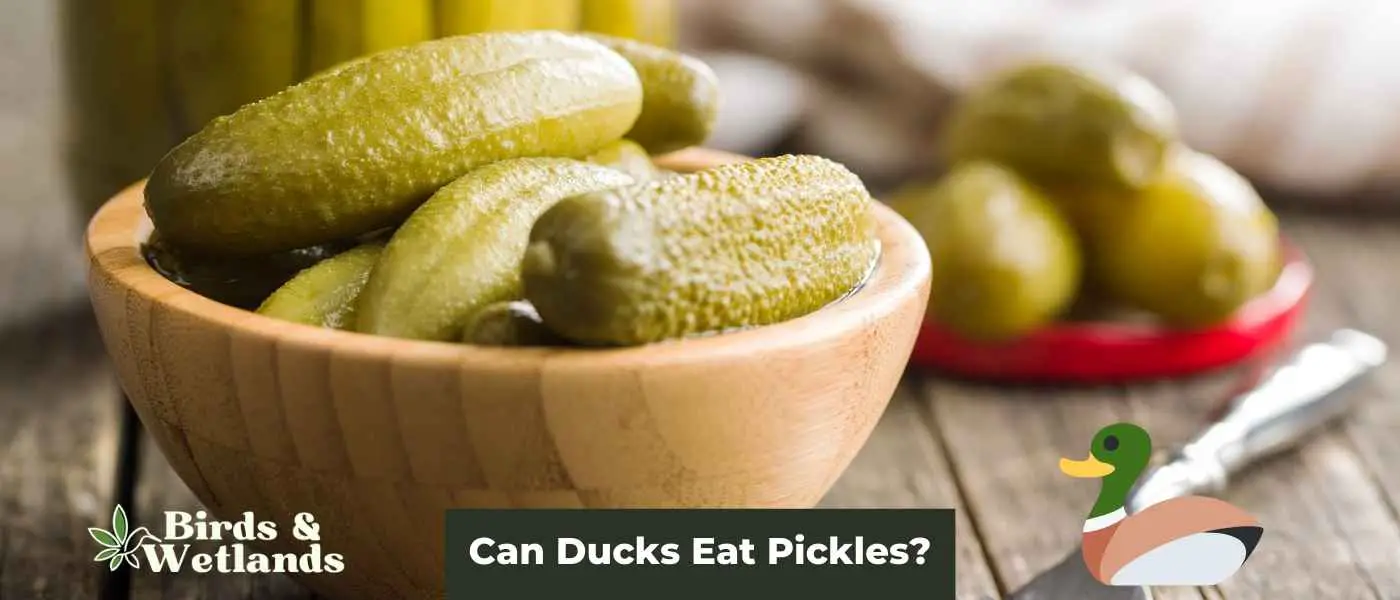Are you curious about whether pickles are a safe and tasty snack for your ducks?
Wonder no more! We unveil the truth about feeding pickles to your feathered friends. We’ll cover everything from potential health risks to nutritional benefits, and provide you with tips on how to safely incorporate pickles into your duck’s diet.
So, get ready to quack up and discover the truth about pickles and ducks!
Can ducks eat pickles?
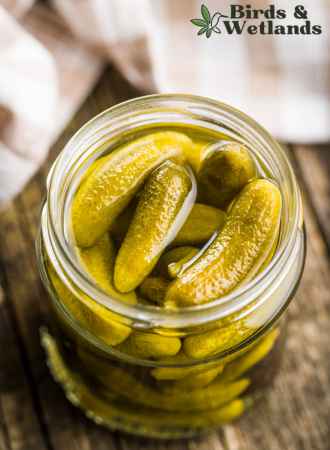
No, ducks should not eat pickles, as they are high in salt and contain vinegar, which can be harmful to ducks. High levels of salt can cause dehydration, kidney problems, and other health issues in ducks. Avoid feeding ducks pickles and other salty foods.
Key Takeaways on Feeding Ducks Pickles
- Ducks can technically eat pickles, but they should only be given in moderation as a treat.
- Pickles are high in sodium, which can be harmful to ducks in large quantities. Too much salt can lead to dehydration, kidney problems, and other health issues.
- It’s important to offer pickles that are fresh and free of any added preservatives or spices, such as garlic or onion, which can be harmful to ducks.
- Always chop the pickles into small pieces to prevent choking hazards and ensure that your ducks can easily digest them.
- While pickles should not be a staple in a duck’s diet, they can be a fun and healthy treat when offered in moderation and with caution.
Can You Feed Baby Ducks Pickles?
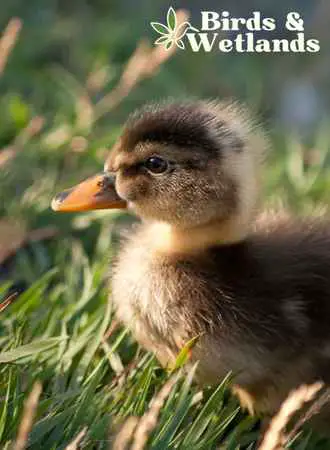
Pickles are not natural foods for ducks, and they can be harmful to the health of ducklings. Pickles are often very high in sodium, which can cause dehydration and electrolyte imbalance in ducks.
Pickles contain preservatives that can be toxic to young ducks. Therefore, it is best to avoid feeding baby duck pickles altogether.
Why Are Pickles Bad for Ducks?
Ducks can eat pickles. But why is this food bad for them?
Salt Content
Pickles can have high salt content. Salt is an essential part of the pickling process. When cucumbers are placed in a brine or salt water solution, the salt helps to preserve them and prevent the growth of bacteria.
Ducks are actually quite sensitive to salt and can easily become ill if they consume too much. Salt can cause dehydration and electrolyte imbalances, which can lead to organ damage and even death.
In addition, salt can damage a duck’s feathers, making it difficult for them to fly and stay warm. Too much salt can also make it difficult for ducks to digest their foods properly.
Preservatives
One of the most common questions about pickles is whether or not they contain preservatives. The answer depends on how the pickles are made. If they are homemade, they usually contain little to no preservatives. However, if they are commercially produced, it is quite common for preservatives to be added.
The most common preservatives used in commercial pickling are sodium benzoate and EDTA. These additives help to extend the shelf life of the pickles by preventing bacteria from growing.
Additionally, the vinegar in pickles usually kills the gut-healthy benefits of cucumber which lowers its nutritional value.
Are Pickles Considered Junk Food?
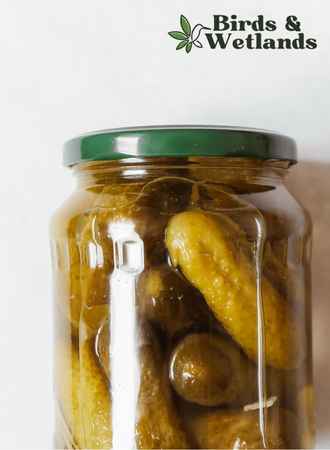
There’s no easy answer to the question of whether pickles are junk foods. It depends on how you define junk foods. Generally speaking, junk food is any food that is high in calories but low in nutrients.
By that definition, pickles would not be considered junk foods, as they are relatively low in calories and contain some vitamins and minerals.
However, pickles are not a substitute for raw or cooked vegetables, which are more nutrient-dense. So while pickles may not be junk foods, they’re also not a particularly healthy option so feed them to wild ducks in small amounts.
What Are Healthier Alternatives to Pickles?
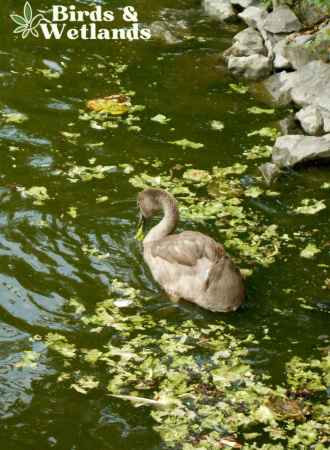
Raising ducks can be a rewarding experience. And your feathered friends aren’t picky eaters, these birds will eat almost anything including pickles. While ducks enjoy eating pickles, they are not the healthiest food for them. Some healthier alternatives for ducks include:
Defrosted frozen peas are a good source of vitamins A and C as well as fiber.
Fruits and berries are also a good source of nutrients and can help ducks stay hydrated. Other fruits that ducks love to feed on include watermelon, grapes, plums and peaches. Avoid citrus fruits thought because their high citric acid content is bad for ducks. Additionally, citrus fruit is believed to interfere with calcium absorption which can be problematic with egg production.
A balanced diet for a duck includes a mix of protein, fat, carbohydrates, vitamins, and minerals. Root vegetables are an excellent source of carbohydrates and vitamins. For example, potatoes are a good source of vitamin C, and carrots are a good source of beta-carotene. In addition, root vegetables are usually high in fiber, which is important for keeping ducks healthy. Cut the vegetables into small pieces to avoid choking.
Ducks can eat tomatoes. Red tomatoes are safe but avoid green tomatoes which are members of the nightshade family.
Oats and corn are good sources of carbohydrates, which provide energy for ducks to stay active. Ducks love to feed on cracked corn.
Leafy greens are another vegetables that ducks love to feed on. Lettuce is a good source of water and fiber. Ducks eat chopped lettuce but choose Romaine over iceberg lettuce.
Ducks love to eat insects and their protein content is your ducks. You can add small quantities of insects to your ducks’ diet.
Ducks can eat eggs. The occasional scrambled eggs can be a part of their nutritious diet.
Other foods you can add to your duck’s daily diet include small fish such as minnows, cut grass and sunflower seeds.
Similar Foods for Ducks
| Cucumber | Is Cucumber Good for Ducks? |
| Asparagus | Can Ducks Eat Asparagus? |
| Peppers | Can Ducks Eat Peppers? |
| Cabbage | Are Ducks Allowed to Eat Cabbage? |
| Cauliflower | Is Cauliflower Safe for Ducks? |
Best Duck Feed Pellets
Are you a duck owner looking for the perfect feed to keep your feathered friends happy and healthy? Look no further than Purina Duck Feed Pellets! With their nutritionally balanced formula and high-quality ingredients, these pellets are the ultimate solution for providing your ducks with the nutrition they need to thrive.
Pros
- Complete Nutrition: Purina Duck Feed Pellets are nutritionally balanced to provide all the essential vitamins and minerals that ducks need to stay healthy and strong.
- Easy to Digest: The pellets are specially formulated to be easy to digest, which makes them ideal for ducks of all ages.
- Promotes Growth and Development: With its balanced nutrition formula, Purina Duck Feed Pellets are designed to support healthy growth and development in ducks.
- Suitable for All Breeds: Whether you have domestic ducks or wild ducks, Purina Duck Feed Pellets are suitable for all breeds of ducks.
- Trusted Quality: Purina has been producing high-quality animal feed for over 100 years, so you can trust that your ducks are getting the best possible nutrition with Purina Duck Feed Pellets.
Cons
- Cost: Compared to other types of duck feed on the market, Purina Duck Feed Pellets can be slightly more expensive. However, many customers feel that the high-quality ingredients and balanced nutrition formula are worth the extra investment.
- Pellet Size: Some customers have noted that the pellet size of Purina Duck Feed Pellets can be quite large, which may not be suitable for smaller or younger ducks. However, many customers have reported that the pellets can easily be broken up or soaked in water to make them easier to eat.

